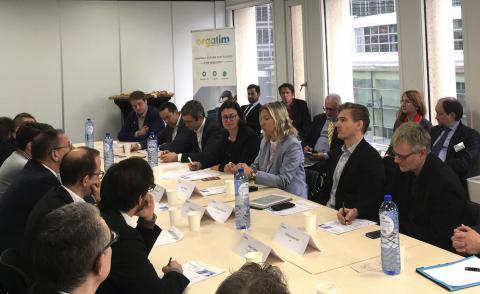Industrial AI: the first 100 days and beyond
4 December 2019
The new European Commission is expected to put forward a framework on AI within the first 100 days. So coinciding as it did with the Commission’s second day in office on 2 December, the Orgalim event ‘Industrial AI: the first 100 days and beyond’ could not have been more timely. The roundtable discussion brought together stakeholders from policy, industry and research to take a closer look at the European AI industry landscape and explore potential directions for a future EU framework.

Kicking off proceedings, moderator Christoph Luykx – Director for Innovation and Digital Transformation at Orgalim – was quick to dispel a persistent myth: Europe is not losing the race when it comes to AI, in particular when it comes to industry applications. This was confirmed by insights shared by three experts working at the vanguard of industrial AI: Elena Fersman, Research Director Artificial Intelligence at Ericsson Research, Christian Guttmann, VP and Chief AI and Data Scientist at Tieto Corporation, and Davio Larnout, CEO of Belgian start-up Radix. They shed light on how AI is being used across sectors to deliver benefits from optimising industrial processes and making networks more intelligent, to unlocking new possibilities for predictive decision-making. Exciting things are happening in research and development too, as explained by Wilfried Verachtert, Principal member of Technical Staff on AI at R&I hub IMEC. A particularly promising opportunity lies in ‘edge computing’, where systems process data near the point where it is generated rather than in a centralised location – an area of tech development where Europe can build on a strong track record.
Turning to the policy options on the table for the new Commission, the discussion zoomed in on two key topics: data and ethics. The value of AI rises exponentially with the volume and quality of data it has to work with. Yet when it comes to data the big question for companies remains: to share or not to share? Max Lemke, Head of Unit at ‘Technologies and Systems for Digitising Industry’ at the Commission’s DG Connect, pointed out that while the benefits of sharing data are known, significant obstacles remain in terms of trust and incentives.
Initiatives such as the German government’s ‘Gaia X’ data and cloud infrastructure proposal could provide a way forward by enabling companies to experiment with AI in a secure environment, noted Robert Dehm, Digital Policy and Telecommunications Counsellor at the Permanent Representation of Germany to the EU. Other options explored were to differentiate between business-critical and non-critical data, or to create models for contractual terms that companies can use for data-sharing agreements.
As for the ethical questions surrounding AI, the discussion touched on a number of hot topics: what are the risks that regulation or certification around ethics could stifle innovation? What regulatory mode would be agile enough to keep pace with technology development? And could an ethical approach to AI become a competitive advantage for Europe? The consensus was that there are no black-and-white answers, as the role ethics or values plays in an AI application will always depend on the use case in question.
One thing is certain, participants concluded: the EU has the opportunity to take pole position in the global AI race – if the right policy and regulatory framework is put in place. Now all eyes are on the Commission and what the first 100 days will bring.

LATEST NEWS
How can we create a dynamic, competitive European high-tech manufacturing base?
Orgalim's key recommendations offer policymake...
